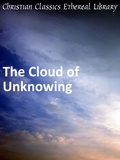I often tell student preachers, “Easter is either the easiest or the hardest sermon of the year.” Sure, a Christian should always have a metaphorical Easter sermon in her back pocket, ready to proclaim the “hope that is within us” with a smooth fast draw. But in truth Easter is tough to proclaim because we don’t know, exactly, what God has in store for us. If the point of Easter is to make resurrected life real to people–to show them the resurrected Jesus–then we’ve got our work cut out for us.
Resurrected life….. hmmm. … We know it’s good and that involves relationship and being with God and being known. We know that we have bodies in the resurrected life (which is important, because it means that we maintain our individuality rather than getting melted into some quasi-Buddhist disembodied-spirit soup). We know it’s about life, not death. Love, for sure, gotta say something about love. But can we get much more specific than that?
I want to commend one particular approach. The classic mystic text called “The Cloud of Unknowing” is a deep and profound meditation on the contemplative life. And occasionally (not always, your mileage will vary) that contemplative life bears the fruit of mystic visions of what life with God might be like. These “consolations of the Spirit” are highly subjective and I would caution anyone who tries to knit them together into any kind systematic picture that they are missing the point. It’s like when you are a child and your parents are about to take you to some place unbelievably awesome like Lego Land or Disney World. They told you enough to get you excited, but their words only drew the most fragmentary and derivative portrait. Running around The Magic Kingdom you thought, “This is so much BETTER than they said!” These attempts to describe the amazing goodness are merely “raids on the inarticulate.”
But these attempts to describe the indescribable are evocative of hope and awaken the imagination of faith. Part of the fun of taking my 4 year old to places he’s never been is getting him excited about what he will encounter. These notions are the product and best advertisement for cultivating a “naked intent unto God.” I love that phrase. It’s not enough to articulate Christian hope as something propositional and doctrinal, we need to do it in such a way as to provoke real longing. We want our people to reach out through the cloud of unknowing, the fog of humanness or horizon of knowledge (pick your vocabulary) with a pure gesture of reaching, stretching loving.
This mystic approach will necessarily require a certain poetic touch. You may want to prepare by simply day dreaming about the awesomeness of your personal vision of heaven. Whom will you see? What will you be doing? What will heaven sound like? Taste like? Use descriptive language–show don’t tell. Don’t say, “Heaven is delightful.” Say, “It’s like raw honey scraped right off the comb onto fresh baked bread and gobbled with sticky fingers.” Don’t say, “you will see everyone you have ever loved.” Rather, “I will see my grandfather and he will tell me how proud he is of who I became.”
Go to the the happy place and share from there. Think it like carefully crafting Easter Eggs to hide for children to find. Use your holy imagination to awaken your people to what God has promised them in Christ Jesus.


